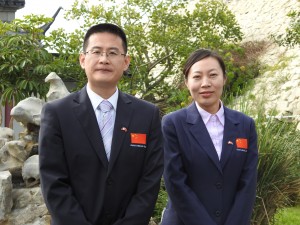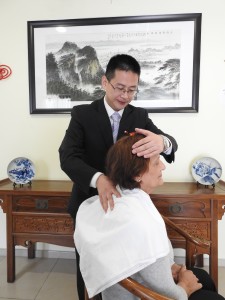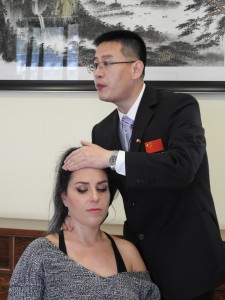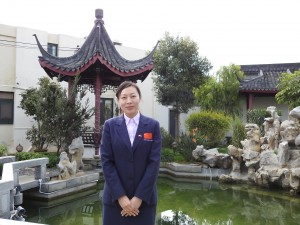Archive for September 20th, 2018
-
Repairing the house before it rains
 “In China we have this concept to repair the house before it rains. We give great attention to our health and well-being because certainly prevention is always better than cure,” declares Dr Xiaoming Yang, a traditional Chinese medicine physician which is presently giving his services at the Mediterranean Regional Centre for Traditional Chinese Medicine in Kordin, Paola.
“In China we have this concept to repair the house before it rains. We give great attention to our health and well-being because certainly prevention is always better than cure,” declares Dr Xiaoming Yang, a traditional Chinese medicine physician which is presently giving his services at the Mediterranean Regional Centre for Traditional Chinese Medicine in Kordin, Paola.This Centre was established in 1994 as part of a project of cooperation between Malta and China. From then on, every two years, a new Chinese medical team was sent to Malta to replace the previous group in order to continue their duty at this Centre and at clinics in Mater Dei hospital and the general hospital in Gozo. This time, due to new arrangements, this group of Chinese doctors will only stay in Malta for one year until a new group comes to take over.
“Each time, the best Chinese doctors are chosen to come over to Malta since this country is regarded as a very important hub from which to introduce traditional Chinese medicine to other countries as well. Malta’s strategic location makes it ideal to act as a significant connection between Asia, Europe and Africa.”
“Nowadays more and more people are pursuing a healthy lifestyle, and they search for ways in how to keep fit, how to prevent disease and how to prolong life. The key to all these questions is to return to nature because we are part of nature. Nature provides us with all the necessities which are indispensable for our survival. The concept of unity between man and nature is the most basic principle on which this traditional Chinese medicine was founded.”
 Through his experience at this Centre, Dr Yang noticed that in general Maltese patients, especially the senior population, complain from arthritis, insomnia, frozen shoulder and neck and lower back pain.
Through his experience at this Centre, Dr Yang noticed that in general Maltese patients, especially the senior population, complain from arthritis, insomnia, frozen shoulder and neck and lower back pain.“It is difficult to find a common factor to all these afflictions because many of the patients have different circumstances. However, I did notice some habits and way of life which may lead to these dicomforts, pains and illnesses.”
“In contrast to China, few Maltese people tend to do regular check-ups. Many of them go to the doctor only when they feel pain or some other disturbance. In China, hospitals send out reminders to people to attend to regular tests and many of them comply. This helps the doctor to identify any health problems at an early stage.”
“Another custom in Malta is to attend gyms, often irregularly, without proper supervision or any sensible preparation. Exercising too hard or too long, and training without suitable warming up will eventually lead to health problems. In China, people use traditional martial arts to train the mind, body and soul by doing slow but effective movements which give rise to no strain.”
“Over-exertion is another issue. Although in China I heard that the Maltese enjoy a siesta in the afternoon, in reality I found out that most people have more than one job, starting very early in the morning and continuing late at night. Such long work hours will inevitably lead to over-exertion which will then generate fatigue, strained muscles or disease. Being always so busy makes it also difficult to attend to the required amount of treatments. In fact, while in China, my patients come to my clinic to get treatment around three to five times a week, in Malta, a patient will call to have therapy only once a week or once a month. In my country, people are given permission to leave work in order to have treatment because if a worker is in pain, he may make mistakes. Taking leave to attend therapy does not seem to be as easy in Malta.”
Since regular therapy is essential to heal faster, Dr Yang dedicates himself to teach his Maltese patients how to do self-treatment exercises.
 “I have trained Maltese people to make tuina manipulation by themselves generally to treat headache, migraine, neck pain or spinal pain. Knowledge of tuina manipulation involves the pressing of particular acupoints to help release discomfort or pain. This helps to increase the curative effect of my therapy at the Centre.”
“I have trained Maltese people to make tuina manipulation by themselves generally to treat headache, migraine, neck pain or spinal pain. Knowledge of tuina manipulation involves the pressing of particular acupoints to help release discomfort or pain. This helps to increase the curative effect of my therapy at the Centre.”“Tuina manipulation includes the use of hand and arm techniques to massage the muscles and tendons of the body, the stimulation of acupressure points to directly affect the flow of Qi energy through the system of channels and collaterals, and manipulation techniques to realign the musculo-skeletal and bone setting.”
Other services offered at the Centre are acupuncture, cupping, ear acupressure, and moxibustion.
“Traditional Chinese medicine is different from Western medicine since it looks at the body as a whole and does not focus just on the inflicted area. When a patient comes to me, I take time to question him about several factors in his life. I look at his appearance, his tongue, his walk. I ask about his appetite and whether he is suffering from insomnia. Then I continue to search for the root of the problem by touching various acupoints in order to identify where the real trouble is. Sometimes a patient might tell me that he is suffering from a headache but then I realize that the problem is in his neck or that it actually is psychological stress.”
During a recent open day held at the Centre with the theme A Journey into Traditional Chinese Medicine, Dr Yang explained about the different treatments which are being offered at the Centre. He also announced that in March, he would be training Maltese people in traditional Chinese martial arts.
“The intent of traditional Chinese martial arts is to relax and exercise the body in a gentle way by absorbing the energy from the surrounding nature and improving the Qi (energy in the body). For several centuries, these martial arts have helped people to obtain and enjoy a state of good health and well-being.”
 Ms Wei Han, the Chinese interpreter at the Centre provided interesting information about the use of herbs to improve health and well-being.
Ms Wei Han, the Chinese interpreter at the Centre provided interesting information about the use of herbs to improve health and well-being.“Being with these doctors I learnt a lot about traditional Chinese medicine and herbs. In the past, when our ancestors were sick, they went back to nature to find answers in how to regain their health. Through experience and experiments they found the right herbs and they used them as natural medicine to treat illnesses and more important to prevent disease and to maintain health. They also found that certain foods can also be used to treat illness. Some herbs can be used both as food and for medicinal therapy. Ginger for example is often used as spice to give flavour to other foods and obviously it is food. But it can also be used as a herb with medicinal values – it helps us to warm our stomach, to improve digestion and to control nausea.”
As a taster to the participants, the Centre’s chef prepared mutton soup with angelica and ginger, and Chinese berry tea with lily bulbs and red dates.
“We are glad to invite at our Centre all those who are interested to know more about traditional Chinese medicine, traditional Chinese martial arts and traditional Chinese philosophy. Visitors can also enjoy our traditional Chinese garden which though small, it incorporates all the typical philosophical ideas and most important elements. Stones in the garden represent the body of the world, like hills and valleys. Water is the spirit of the world providing oxygen, like blood running through the veins. The pavilion is always located at the best point where one can watch the sunset and the sunrise, and meditate about life or simply relax and have a rest. Our patients find this garden optimal to calm down and to escape from the outside world where pain ceases to exist, at least for a short time,” concluded Ms Han.
For more information, one can contact the Mediterranean Regional Centre for Traditional Chinese Medicine on 2169 1799.
(This feature was published in The Times of Malta in 2018)
Travelogue
Archives
Recent Posts
- A MATTER OF FATE
- MALTA’S PREHISTORIC TREASURES
- THE MAGIC IS IN THE DETAIL
- THE SELLING GAME
- NEVER FORGOTTEN
- Ġrajjiet mhux mitmuma – 35 sena mit-Traġedja tal-Patrol Boat C23
- AN UNEXPECTED VISIT
- THE SISTERS OF THE CRIB
Comments
- Pauline Harkins on Novella – Li kieku stajt!
- admin on IL-KARNIVAL TRAĠIKU TAL-1823
- Albert on IL-KARNIVAL TRAĠIKU TAL-1823
- Martin Ratcliffe on Love in the time of war
- admin on 24 SENA ILU: IT-TRAĠEDJA TAL-PATROL BOAT C23